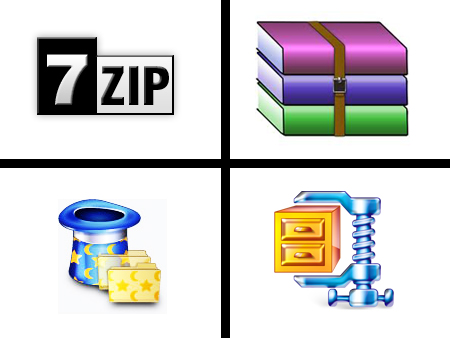Compression Performance: 7-Zip, MagicRAR, WinRAR, WinZip
We're taking a look at the the features, performance, and compression rates of four file archiving and compression tools: the free and open source 7-Zip, the heavyweight WinRAR, the old-school WinZip, and the lesser-known MagicRAR.
Compression: Your Data, On A Diet
Why you can trust Tom's Hardware
Everyone who regularly works with computers handles compressed files on an almost daily basis, we'd guess. The archives come in many shapes and sizes, and you might not even realize that some files are compressed: software installation packages, picture formats, audio files, and many videos, for example.
Of course, the basic idea behind file compression is to decrease the space needed to store data, and, perhaps more important, cut down on the time it takes to transfer that information. That's the reason most folks compress their files. Perhaps you're using an email server with attachment limits, or maybe you're archiving your important user data for backup. In those cases, the time it takes to complete a compression job is ultimately less important than the compression rate you're able to achieve.
There are many tools for Windows that promise all of the compression and archiving functionality that anyone could ever need. The vast majority of them can handle ZIP, the most commonly-used compression format, along with a number of other popular formats, such as 7z, RAR, TAR, and GZIP.
Today, we benchmark three of the most well-known archiving and compression tools: 7-Zip, WinRAR, and WinZip. Not only do they support a massive number of formats, but they also integrate with Windows Explorer, making their functionality easy to access from where it’s actually needed. Some of the tools even offer additional features. For example, the latest version of WinZip include social media and cloud functionality. The more exotic MagicRAR, which claims to triple Windows’s built-in full-disk compression functionality, completes today’s round-up.
Get Tom's Hardware's best news and in-depth reviews, straight to your inbox.
-
mayankleoboy1 1. There is no difference between LZMA and LZM2 . Both are the same algorithm. The only difference is LZMA is limited to 2 threads. LZMA2 is much more threaded, but uses double the amount of RAM.Reply
2. PPMd is strictly for compressing text. It compresses text better than any other algo. But it is limited to 1 core only.
3. WinRar 4.2 is much better threaded than previous versions.
4.7z threading depends a lot on the type of file compressed. On large files, it can use 100% of any number of cores. For many small files, it generally uses only 1 complete core. -
mayankleoboy1 7ZIP is even more impressive when you consider that the LZMA format was designed by one single person. And then the program 7ZIP was also coded by that single person only.Reply
Maybe contribute a few dollars to Igor Pavlov , the creator of 7Zip ? -
s3anister This is an interesting article, I was rather surprised by the overall poor performance of WinRAR in every aspect when compared to 7zip.Reply -
ojas Hey i had written this in the Haswell preview, but i think Chris missed it, so i'm repeating it here, since it is related.Reply
Could we have an AES-256 encryption comparison between CPUs and/or archive managers?
Like without encryption vs with encryption, encryption with and without OpenCL, etc. -
abbadon_34 Nothing new here, 7zip > WinRar > WinZip for quite some time. Why the inclusion of MagicRAR is a mystery, maybe a paid (failed) review? I'd be interested in an examine of the Parity/Recovery option of WinRAR and others. While still far behind PAR2 (or even the shady ICE Ecc), it is an important feature in Archiving that deserves more attention.Reply -
PreferLinux mayankleoboy11. There is no difference between LZMA and LZM2 . Both are the same algorithm. The only difference is LZMA is limited to 2 threads. LZMA2 is much more threaded, but uses double the amount of RAM.Reply
2. PPMd is strictly for compressing text. It compresses text better than any other algo. But it is limited to 1 core only.
3. WinRar 4.2 is much better threaded than previous versions.
4.7z threading depends a lot on the type of file compressed. On large files, it can use 100% of any number of cores. For many small files, it generally uses only 1 complete core.4. You mean the 7Z format rather than 7-Zip.
I've seen 7-Zip, using the Zip format, hitting 100% CPU usage when archiving around 1500 – 2000 files, the vast majority of which (like >75%, if not >90%) were tiny, about half under 100 B and the other half between 1 kB and 4 kB. But with the same set of files I did a quick test, and using LZMA2 to 7z it was using 1 and a bit cores (going by my total CPU usage).
